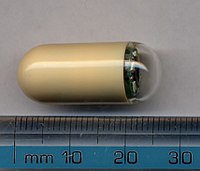
Nanoscale Modeling of Surface Phenomena in Aluminum Using Machine Learning Force Fields
Sign Up to like & getrecommendations! Published in 2020 at "Journal of Physical Chemistry C"
DOI: 10.1021/acs.jpcc.0c05512
Abstract: The study of nano-scale surface phenomena is essential in understanding the physical processes that aid in technologically relevant applications, such as catalysis, material growth, and failure nuc... read more here.
Keywords: modeling surface; phenomena aluminum; surface; aluminum using ... See more keywords

Modeling the Surface Field From an Ingested Radio Transmitter With an Approximate Attenuation Model for Gastroenterology Investigations
Sign Up to like & getrecommendations! Published in 2020 at "IEEE Transactions on Biomedical Engineering"
DOI: 10.1109/tbme.2019.2916632
Abstract: Objective: The precise location of an ingested radio transmitter/sensor is of importance in gastroenterology studies. Given the complex geometry of the gut and the very large variations in human size and electromagnetic characteristics, inverse modeling… read more here.
Keywords: field; radio transmitter; gastroenterology; ingested radio ... See more keywords

Viscoplastic Modeling of Surface Relief Grating Growth on Isotropic and Preoriented Azopolymer Films
Sign Up to like & getrecommendations! Published in 2023 at "Polymers"
DOI: 10.3390/polym15020463
Abstract: We report on solving of two intriguing issues concerning the inscription of surface relief gratings within azopolymer thin films under irradiation with SS, PP and RL interference patterns. For this, we utilize the orientation approach… read more here.
Keywords: growth; surface; surface relief; modeling surface ... See more keywords

Measurements and modeling of surface–atmosphere exchange of microorganisms in Mediterranean grassland
Sign Up to like & getrecommendations! Published in 2017 at "Atmospheric Chemistry and Physics"
DOI: 10.5194/acp-17-14919-2017
Abstract: Abstract. Microbial aerosols (mainly composed of bacterial and fungal cells) may constitute up to 74 % of the total aerosol volume. These biological aerosols are not only relevant to the dispersion of pathogens, but they also… read more here.
Keywords: modeling surface; measurements modeling; mediterranean grassland; grassland ... See more keywords